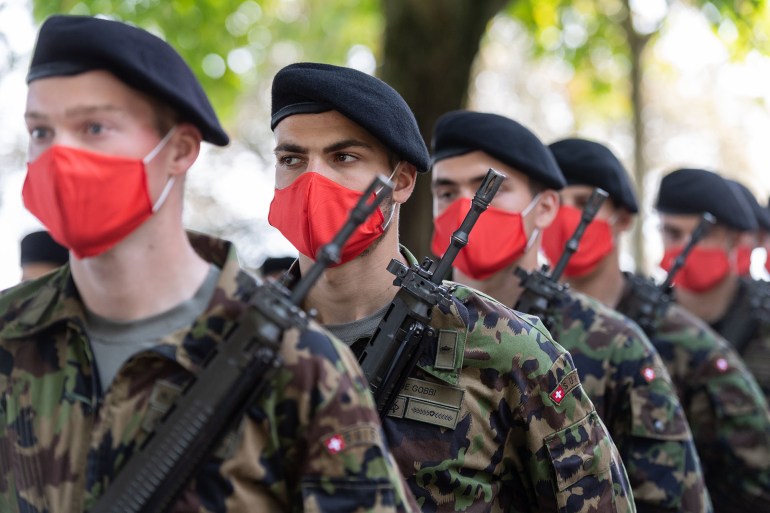In an effort to reduce the risk of an outbreak of "Covid-19" in the barracks, the Swiss army decided to change the form of military recruitment this year for thousands of new recruits to "military service from home."
"This is something new," said the spokesman for the Swiss army, Daniel Rest, in response to a question by the French press, "but it is the best solution that has imposed itself" in the time of the pandemic.
In the Swiss army, envoys accompanied by thousands of specialists must perform military service for a period of no less than 4 months before being called up annually to participate in 3-week training courses.
And this year, about 15 thousand young Swiss men of both sexes are required to perform military service, but the current health crisis has raised fears in the army about the inability to care for the injured in the event of an outbreak of the new Corona virus among the new recruits.
Hence, the entry of conscripts will be in attendance at the military school "in stages to ensure that every conscript who has tested positive for Covid-19 receives the best attention, and that appropriate isolation and quarantine measures will be applied with him," according to the Federal Ministry of Defense, in a statement.
A first batch will actually enter the barracks from Monday, including "health conscripts" whose recruitment is of an emergency character to support the teams recruited mainly by the civilian teams in Swiss hospitals.
Military service from a distance
But 5 thousand of the 15 thousand new recruits this year will not enter the barracks Monday, but will begin training from their homes for a period of 3 weeks.
They will perform what looks like "military service from a distance", as the Swiss newspaper "Le Tan" called in a satirical article entitled "The dawn of military service on the couch."
This innovative pattern of military service sparked a mockery of some, as one internet user jokingly wrote, "When will we see wars fought from the couch?"
(European)
Rist explains that these new recruits "all received this week an educational program based on models (...) that they must follow at home, in a theoretical framework in front of the screen."
Before actually wearing a uniform, they should learn many questions, including how to use a service weapon, access to information on biological and chemical weapons, as well as military bases and health protection.
"We leave them with a choice about when to follow lessons. We start from the principle that a person who pursues his lessons seriously needs 6 hours of distance learning per day," says Rist.
This extraordinary military service also includes "4 hours of sports training per week" through a special application.
These three weeks will be counted as "days of active service", and then the recruits who follow them will receive financial income within the amounts allocated to each recruiter during military recruitment.
Monitor impossible
This innovative pattern of military service sparked the ridicule of some, as one Internet user joked, "When will we see wars fought from the couch?"
Some found this idea underestimated, among them Stefan Hollenstein, the head of the Swiss Officers' Authority, who said in statements reported by Le Tan newspaper, “I understand the need for unconventional concessions, but I look somewhat suspiciously at that. Military service has a practical and social character that cannot be done. To be replaced by electronic learning. "
Al-Askari is also concerned about the lack of monitoring of “remote military service” activities.
Rist admits that "it is not possible to monitor the behavior of 5,000 young people," but "it is clear that there are some rules" and "the system notices the absence of people."
After the three weeks of domestic service, the recruits will undergo a knowledge test after moving to the barracks.
And Rist warns that "those who will not pass the test will not be entitled to exit permits."

